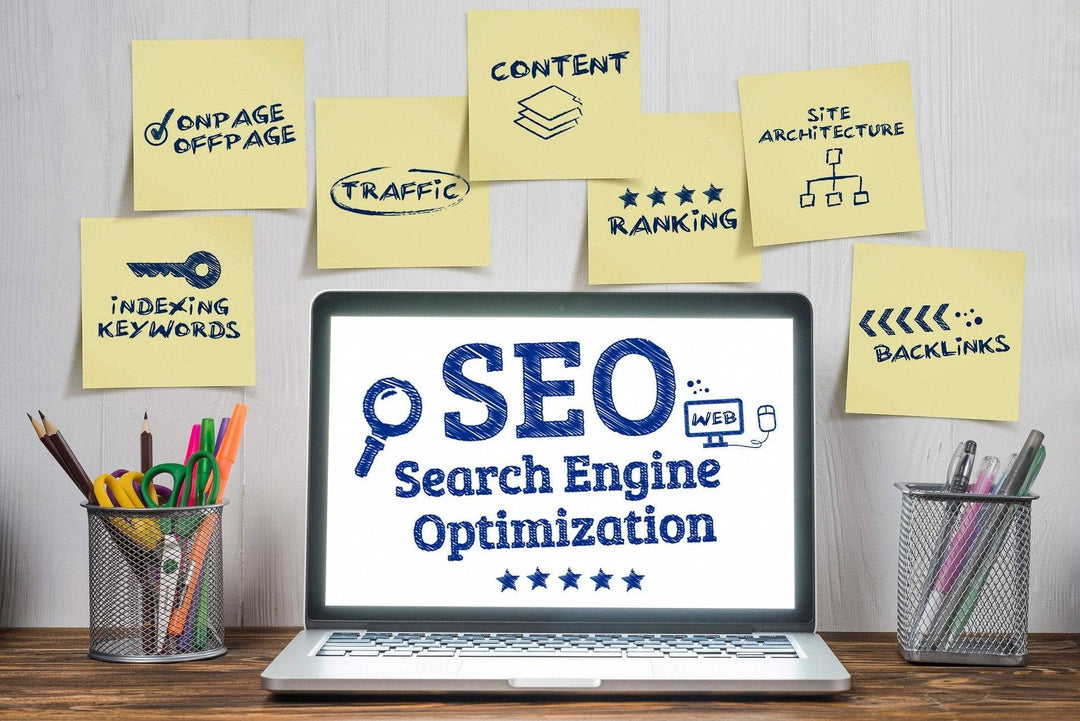Waking up one morning and realizing your E-commerce site is driving huge traffic, sounds enticing right! It won't be a dream now. There are a lot of verified methods that you could follow to optimize your search engine to hit the target audience. Paying attention to SEO (Search Engine Optimization) helps you to maintain an evergreen online presence. SEO is everything that could electrify your business to the next level.

Photo by Austin Distel on Unsplash
There may be many people who want to connect with your work and products, but everything goes in vain if you cannot showcase your dynamic business presence through search engines. The digital era helps us to understand the mentality, desires, and common interest among people. SEO is all about utilizing this information to grab attention.
Now, Let’s figure out the rudiments of SEO to upgrade your micro business platform. eComIntegrate, the Google Certified Digital Marketing Agency, will guide you throughout the process. Our SEO package includes keyword research, onsite optimization, monthly reports, Article writing, Backlink opportunity reporting and Outreach strategy consulting.
Nuts and bolts of SEO

Photo by Duncan Meyer on Unsplash
SEO is the process of amplifying the traffic or visibility of your online platform to the users of web-oriented search engines. If you want to know something, the first thing that comes to your mind is "come let's Google it". And then when you type the query, your search engines (Google, Yahoo, Bing, etc.) will show the top results that match with your keyword. For finding the top results, you should ensure that the website meets the technical requirements. The important elements of technical SEO include crawling, indexing, and website architecture.
E-Commerce SEO ensures that your product page or website appears among the first ten search results. It is a marketing technique. Once you know what your target audience expects from you, then you will handle SEO easily. You can access it through organic search and paid search.
1. Organic Search Results
The organic search results are unpaid results, which are natural and carries the most relevant information. The search engine scans all the fed data that carries a chink to your keyword. It shows results that contain the proper title, results that have tags, and some meta-descriptions as well. In organic search, the ranking of the results depends upon the relevance of the information.
2. Paid Search Results
The paid search results are a business strategy to rise above the organic search results. You can easily identify paid search results and organic search results. Paid search results appear on the top of the page with an outlined ‘Ad’ tag near the URL.
While considering the organic and paid results, one thing makes the organic search result friendlier. It stays forever. It's all about the relevance of the content, while the paid search result stops displaying your content once you stop paying.

Photo by 🇨🇭 Claudio Schwarz | @purzlbaum on Unsplash
Top reasons why you need SEO
SEO has become an inevitable part of e-commerce platforms. Let’s see some top benefits of SEO:
- Generates brand awareness by appearing among the top results.
- Helps to create smooth loadable websites, conversable in all devices.
- Makes your business compatible in the market.
- Guide the target audience to reach out to your site.
- Promote the credibility of your site.
- It is an everlasting strategy to ensure online presence.
How search engines determine the relevance of the information
Although numerous data will be available on the provided keyword/query, the search engine only assembles the best results on the Search Engine Result Page (SERP). It depends upon factors like the geographical location of the user, quality of the contents, and analyzing the search history and backlinks of the user.
How to do Search Engine Optimization?
We have been discussing the basics of SEO so far, now we will discuss some basic e-commerce SEO tactics to up-bring your business, foreseeing a competitive market.
1. Play with Keywords

Photo by Scott Graham on Unsplash
You should learn the difference between using keywords for blogs/information sites and e-commerce platforms. For an e-commerce site, you have to use commercial keywords that common people use. More than being creative and scholarly, go for something that can be grasped by all. Your goal is to increase the sale.
2. Prepare your Content wisely

Photo by Nick Morrison on Unsplash
Product content counts a lot in the optimization process. You might have seen the search engine displaying the proper or direct result on the top of the page. Providing direct answers will help to increase the ranking of your page. Precise content with competently used keywords has the scope of high visibility on the SERP.
3. Focus on the search engine suggestions

Search engine suggestions help in easy product discovery. Sometimes, the customer will not be knowing the exact name of the product they are searching for. The retrieved information in their memory may not be accurate. In such cases, the autocomplete feature may help them to tackle this problem.
4. Ensure user-friendly site structure
Always try to keep your site structure classy. Customers want to see a packed site where they can find everything easily. Detail everything in the homepage. Users hate more clicks and more links. If you can help them with just one click, it helps to build reliability. If what they want is multiple clicks away from the actual homepage, they doubt the credibility and show reluctance to move forward. Don't keep the 'Buy Online' option too far, it is like giving your customer enough time to rethink.
5. Implement on-page and off-page SEO
On-page and off-page SEO are two Keys of search engine optimization. Let’s see how they work:
On-page SEO
On-page SEO is the optimization of various parts of your website. It focuses on the page speed, keywords, contents in the website, easy accessibility of the website, social tags, headings, URL structure etc. On-page optimization is fully under your control.
Off-page SEO
Off-page SEO is all about increasing the credibility of your website through internal linking. The more links you attach in your websites help to gain better ranking by building your domain authority score. Though the number of links matter, never compromise with your links' quality.
Now if you ask us what is more important, online-page SEO or offline page SEO? The answer is we require both these strategies while optimizing your website or e-commerce platform. They will work together to improve page ranking. It is imperative to maintain a balance between the two.
6. Maintain an easily accessible URL

Photo by Kaleidico on Unsplash
Selecting a URL is an important aspect of e-commerce SEO. More than focusing on creativity, focus on generating something easily accessible. If the URL contains keywords like ‘buy online’, ‘quality products’ etc, it will help in optimizing the search engine. Also, always try to match the URL with the title of your online store.
7. Use the Schema Markup technique
Schema markup is a semantic vocabulary that you need to add to the HTML to enhance the search engine visibility of your e-commerce platform. This semantic vocabulary helps the search engine to easily distinguish the page information.

Photo by Mika Baumeister on Unsplash
8. Provide ‘Alt attribute’
'Alt attributes' are text alternatives for content images. Providing images with 'alt attributes' helps to clarify the images you provide on your e-commerce site. If the image faces any slight interruption, the 'alt text' will be displayed instead of the image.
What you should avoid
- It is good to use keywords, but don't clutter your content with keywords.
- Avoid stuffing your content with inauthentic links.
- Stop promoting irritating ads
- Non-mobile website versions need modification.
To Sum-up
Activating your e-commerce platform will become an effortless task if you have the right guidance. eComIntegrate will help you understand the various methods involved in optimizing the search engine. SEO is a significant milestone to boost the revenue and sales of your e-commerce website. If you follow the above mentioned solid strategies, we are sure that you will create a unique niche on the SERP.






Leave a comment